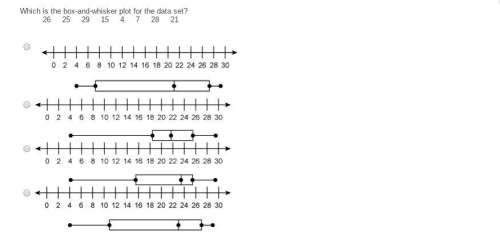
Mathematics, 29.11.2019 05:31 bay62
We now have lim x → [infinity] (4x − ln(x)) = lim x → [infinity] 4x 1 − ln(x) 4x . let's first focus on lim x → [infinity] ln(x) 4x . since ln(x) → [infinity] as x → [infinity], then this limit is indeterminate of type [infinity]/[infinity]. using l'hospital's rule, we find: lim x → [infinity] ln(x) 4x = lim x → [infinity] 1 = 0 .

Answers: 1
Another question on Mathematics

Mathematics, 21.06.2019 14:00
What is the product of the radical expression. (7-2square root) (8+2 square root)
Answers: 2

Mathematics, 21.06.2019 18:30
In the triangles, tr = ge and sr = fe. if = 3.2 ft, which is a possible measure of ? 1.6 ft 3.0 ft 3.2 ft 4.0 ft
Answers: 2

Mathematics, 21.06.2019 23:30
When a valve is open 281 gallons of water go through it in one hour the number of gallons that would go through in 94 hours is
Answers: 1

Mathematics, 22.06.2019 01:00
Y= x – 6 x = –4 what is the solution to the system of equations? (–8, –4) (–4, –8) (–4, 4) (4, –4)
Answers: 1
You know the right answer?
We now have lim x → [infinity] (4x − ln(x)) = lim x → [infinity] 4x 1 − ln(x) 4x . let's first focus...
Questions

English, 12.08.2019 11:10



English, 12.08.2019 11:10

Mathematics, 12.08.2019 11:10

Business, 12.08.2019 11:10



Chemistry, 12.08.2019 11:10




Geography, 12.08.2019 11:10

Mathematics, 12.08.2019 12:10

Social Studies, 12.08.2019 12:10


History, 12.08.2019 13:10

Mathematics, 12.08.2019 13:10


Computers and Technology, 12.08.2019 13:10




